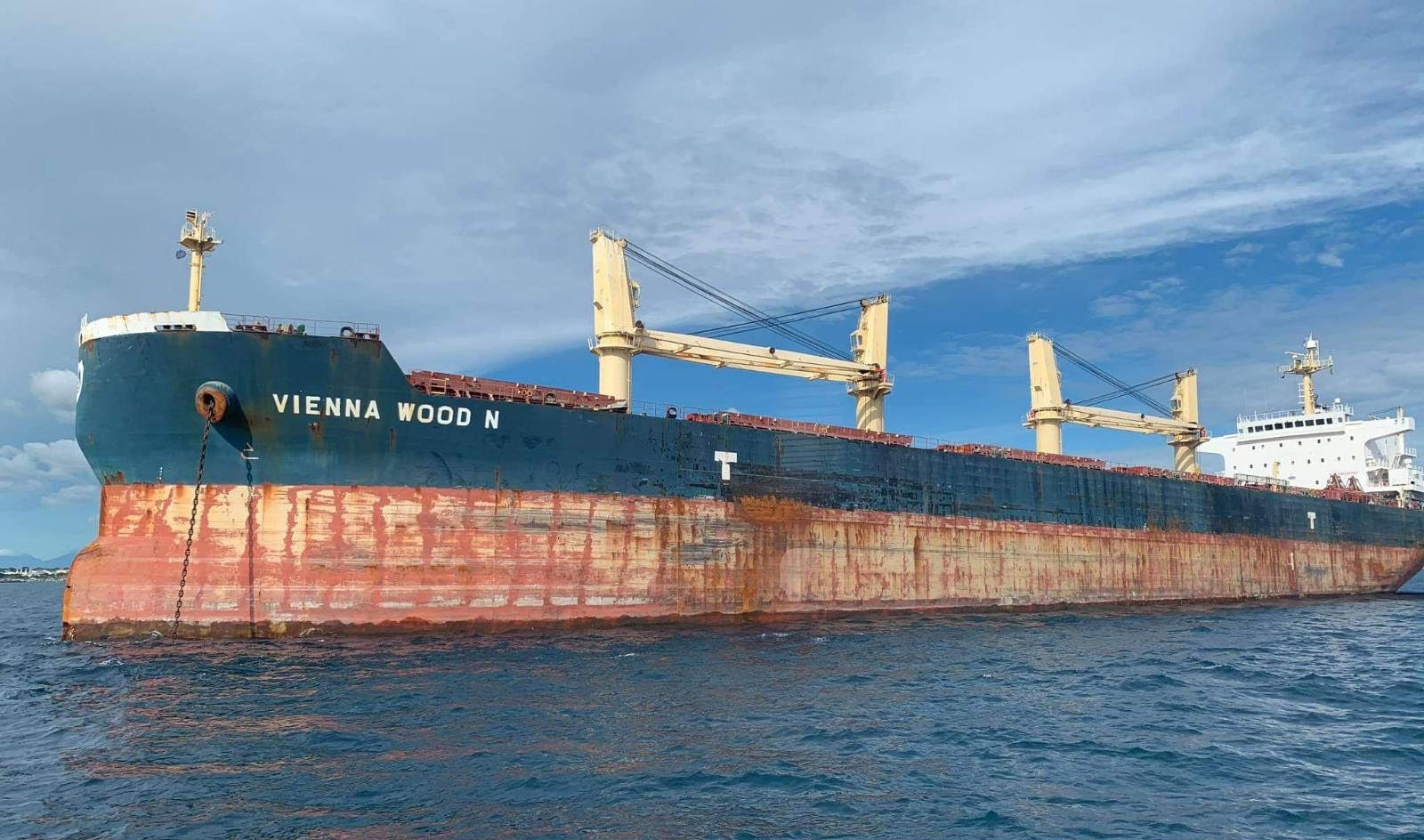
Hong Kong-flagged cargo vessel MV Vienna Wood collides with a Philippine fishing boat off the coastal waters of Mindoro on June 27, 2020. PCG
MANILA, Philippines — It took three hours for the Hong Kong-flagged bulk vessel MV Vienna Wood to report its collision with a Philippine fishing boat in the waters off Mindoro to authorities.
At an online press conference, Philippine Coast Guard (PCG) commandant Vice Adm. George Ursabia Jr. said the PCG command center received the report around 1:46 a.m. of Sunday (June 28) via e-mail.
The collision happened at 10:20 p.m. on Saturday (June 27), he said.
Fourteen fishermen went missing after the foreign vessel collided with Philippine fishing boat FV Liberty 5 off the coast of Mamburao town in Occidental Mindoro.
Ursabia said an investigation is underway.
“Mga ganyang distress call, the soonest possible time dapat maipadala (Those distress calls should be sent the soonest possible time),” he said.
“Isa yan sa tinitingnan, why it took three hours in sending such distress call (That’s one of the things being investigated, why it took three hours in sending such distress call),” he added.
The PCG chief couldn’t immediately say why the crew of MV Vienna Wood would send the distress call through e-mail instead of other means.
“It really depends on the location. Probably they tried via VHF radio channel 16 but in that area probably it’s out of range and they decided to send it via e-mail,” he explained.
NO GMDSS capability
The PCG, he said, is not equipped with the Global Maritime Distress Safety System (GMDSS), a maritime communications system used for emergency and distress messages. The foreign vessel could have reached out to authorities using this technology.
“Wala tayong GMDSS kaya isa ‘yan sa mga rason that the coast guard has come up with an upgrade capability in receiving distress calls (We don’t have GMDSS that’s why that’s one of the reasons the coast guard has come up with an upgrade capability receiving distress calls),” he said.
“Nasa pipeline na sana kaya lang dahil sa COVID, ibinalik sa amin…There’s really a need for us to upgrade our capability in receiving distress capability. Sa ngayon, ang meron tayo ay thru VHF and email (It’s already in the pipeline but for COVID it should have been back with us. There’s really a need for us to upgrade our capability in receiving distress capability. Right now, we have through VHF and e-mail),” he added.
‘Crucial three hours’
Ursabia said the three hours were “very crucial.”
“Ang theory ko tumaob na ‘yan so ‘pag tumaob na ‘yon habang maaga pa it was not taking so much water yet so hindi pa siya submerged pero capsized na siya so pwede pa sana mapasok ‘yung ibang spaces niya para sana makuha natin ‘yung mga na-trap doon if ever na mga missing crew (My theory is that it already flipped so if it flipped and it’s still early it was not taking so much water yet so it’s not yet submerged but already capsized so some spaces there could be accessed to recover those who are trapped)“ he said.
The foreign vessel remained in the area after the collision, but it did not send assistance.
“According to them they just stopped and remained in the area without deploying any small boat to conduct search and rescue or immediate assistance,” Ursabia said.
“They did not leave the area for reason that there were already a number of fishing vessels present in the area not to mention that their ship is very big that they have to maneuver it afar from the small vessel because of safety reasons,” he said.
For the coast guard chief, this was understandable given the huge size of the vessel.
“From a mariners point of view, you have to bring your ship away where it will be safe and will not endanger other vessels responding there,” he explained.
“It will take time to launch their boats in order to respond, not to mention that the visibility was very, very poor, as well as the sea condition,” he said.
“Their priority then was to bring the ship away from the capsized fishing vessel and to those responding vessels because if not, they might also hit other responding vessels,” he added.
He said that based on the report, other vessels in the area tried to help but was prevented by “unfavorable sea conditions and poor visibility.”
The collision had revived memories of the ramming and sinking of Philippine fishing boat Gem-Ver 1 in the West Philippine Sea last year by a Chinese trawler that abandoned 22 Filipino fishermen in the open sea.
But Malacanang has dismissed Saturday’s sea tragedy as a simple collision. Ursabia agrees.
“Definitely. ‘Yung area na yan, sealane ‘yan. Highway ‘yan sa dagat so parang ihahantulad sa highway sa lipa na ‘yung bulk carrier ay isang 10-wheeler truck at ‘yung fishing vessel ay isang Isuzu Elf na truck na nagbanggaan (Definitely. That area is a sealane. That’s a highway in the seas so it’s like a highway on land and the bulk carrier is a 10-wheel truck and the fishing vessel is an Isuzu Elf truck),” he said.
“They are users of the road, in this case users of the sea, na nag-nanavigate and while navigating eh nagbangaan. ‘Yung lang kasimple ang logic na ‘yan (They are users of the road and in this case, users of the sea that are navigating and while navigating they collided. That’s the simple logic of it),” he added.